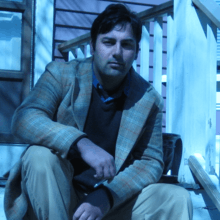Basharat Peer
| Basharat Peer | |
|---|---|
 Basharat Peer in 2014 | |
| Born |
1977 Anantnag, Jammu and Kashmir, India |
| Nationality | Indian |
| Ethnicity | Kashmiri |
| Education |
Political Science at Aligarh Muslim University Journalism at Columbia University |
| Occupation | Journalist, Author and Political Commentator |
| Notable credit(s) |
Reporter at Rediff Assistant Editor of Foreign Affairs Currently Edior of India Ink Author of Curfewed Night |
| Religion | Islam |
Basharat Peer, (born 1977) is an Indian journalist and script writer of Kashmiri ethnicity, based in New York. He is also an author and political commentator.[1][2][3]
Early life
Peer was born in Seer, Anantnag in Jammu and Kashmir, India. He attended school in the valley of Kashmir and continued his education after matriculation in Aligarh, Uttar Pradesh away from his strife-ridden birthplace. He studied Political Science at Aligarh Muslim University and Journalism at Columbia University.[4] Basharat Peer's father is a retired officer of the Indian Administrative Service.
Career
He started his career as a reporter at Rediff and Tehelka. During the initial days of his career he was based in Delhi. He has worked as an Assistant Editor at Foreign Affairs and was a Fellow at Open Society Institute, New York. He has written extensively on South Asian politics for Granta,[5] Foreign Affairs,[6] The Guardian,[7] FT Magazine,[8] The New Yorker,[9] The National[10] and The Caravan.[11]
He is the author of Curfewed Night, an eyewitness account of the Kashmir conflict, which won the Crossword Prize for Non-Fiction and was chosen among the Books of the Year by The Economist and The New Yorker.[12][13] Peer currently runs the "India Ink" blog on the digital edition of The New York Times.[14]
Notable work
Peer was also the script writer along with Vishal Bhardwaj for the Bollywood film Haider. He also had a special appearance in the film.
References
- ↑ "The Wail of Kashmir". Indian Express. 30 November 2008. Retrieved 14 May 2010.
- ↑ "Fineprint: Curfewed Night, a memoir on Kashmir". CNN IBN. 16 November 2008. Retrieved 14 May 2010.
- ↑ "How green was my valley". The Hindu (Chennai, India). 7 December 2008. Retrieved 14 May 2010.
- ↑ http://www.journalism.columbia.edu/news/362
- ↑ "Kashmir's Forever War". Granta.
- ↑ "India's Broken Promise". Foreign Affairs. Retrieved May/June 2012 Issue. Check date values in:
|accessdate=(help) - ↑ Peer, Basharat (5 July 2003). "Victims of December 13". The Guardian (London). Retrieved 5 July 2003.
- ↑ "Divided but not forgotten". Financial Times Magazine. Retrieved 16 November 2012.
- ↑ Peer, Basharat (13 May 2013). "Posts by Basharat Peer". The New Yorker.
- ↑ "Bound for success". The National. Retrieved 6 June 2009.
- ↑ "The Legacy of The Looming Tower". The Caravan. Retrieved 1 September 2010.
- ↑ Najar, Nida (24 February 2010). "Witnessing Kashmir's Invisible War". The New York Times.
- ↑ Shamsie, Kamila (5 June 2010). "Curfewed Night: A Frontline Memoir of Life, Love and War in Kashmir by Basharat Peer". The Guardian (London).
- ↑ http://www.capitalnewyork.com/article/media/2013/06/8530821/prominent-kashmiri-journalist-basharat-peer-take-over-times-blog-india
- Sircar, Subhadip (11 August 2010). "'My Nationality a Matter of Dispute': Basharat Peer". The Wall Street Journal. Retrieved 16 December 2011.
External links
- Video: Basharat Peer discusses his book 'Curfewed Night' at the Asia Society, New York, 12 April 2010 Article about Basharat Peer adapting and co-writing the screenplay of the movie Haider, an adaptation of Hamlet set in mid-1990s Kashmir and directed by Vishal Bhardwaj. http://www.hindustantimes.com/lifestyle/books/the-dawn-after-curfew/article1-1192577.aspx
|